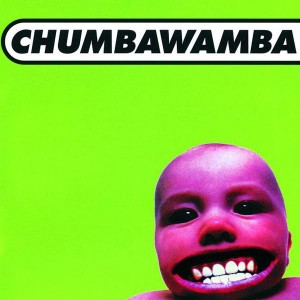Chumbawamba, the self-described “anarchist collective” from the U.K. had a surprise hit in the 1990s with the pub crawl anthem “Tubthumping” and spent the better time after that, seemingly, purporting they could not care less. Or, at the very least, they were perceived as not caring less. There’s been plenty of speculation over the years over whether that is the case or not. The group was far from your average lucky strike that emerged from nothing, had a huge hit, then receded back into nothing. In fact, the history of Chumbawamba is much longer than the average American would likely know, and therein lies a problem. Perception, it appears, is everything.
 What know you of “Tubthumping”? What does that even mean? Even if you think you’ve never heard the track, you have. Interspersed between gang chants of “I get knocked down! But I get up again! No, they’re never going to keep me down!” was Jude Abbott’s sweetly sung line, “Pissin’ the night away, pissin’ the night away…” Ring a bell? As you might expect, American views of the group are vastly different than European views, where Chumbawamba had been a gadfly and thorn-in-side of…well, a lot of people both before and after their surprise hit.
What know you of “Tubthumping”? What does that even mean? Even if you think you’ve never heard the track, you have. Interspersed between gang chants of “I get knocked down! But I get up again! No, they’re never going to keep me down!” was Jude Abbott’s sweetly sung line, “Pissin’ the night away, pissin’ the night away…” Ring a bell? As you might expect, American views of the group are vastly different than European views, where Chumbawamba had been a gadfly and thorn-in-side of…well, a lot of people both before and after their surprise hit.
The collective had been active since the early-80s when they were anarcho-punk folkers. They took their causes very seriously like animal rights, UK miners, the anti-war sentiment, and a disdain for the machinery of causes like Live Aid, whereby the primaries of the group felt the efforts were less about raising funds for feeding the starving in Africa and more about self-promotion. Their album covers were equally controversial, including that of Anarchy, with a close-up of a baby exiting the birth canal. They had, off and on, day jobs rather than expecting an income from the music business. They railed against the greed of major record labels. In 1997, they joined with one of the UK’s biggest labels, EMI, and set off a firestorm among their previous tourmates and labels, all of whom decried Chumbawamba as “sell-outs.”
In their defense, the band stated that their associations with the indie labels were disillusioning, that these companies were just as singlemindedly focused on the bottom line as all the rest, and it didn’t matter who Chumbawamba dealt with if that was how things worked. Another wrinkle was that their previous label took issue with the mixing of the record they were working on. The band always had control of their production and packaging, even in their earliest cassette-only punk days. It seems that this overture for interference pushed them over to EMI with that record, which just happened to be Tubthumper.
America is not the world. That is a form of egomania that the world has, for over four decades or more, regularly warned us of. We tend not to get it. When we make space invader movies, the aliens attack America as a proxy for the whole Earth. Our World Series partners with only one other country and, lucky for us, they’re on the same continent. We tend to make our small perception out to be the perception for everyone and everything, because we are America, and why should you doubt it?
When the U.S. looks at Chumbawamba, we see one fluke, a weird song about getting steaming drunk, starting fights, and being tough enough to keep getting up for the next punch in the mouth. The UK saw a couple songs after that made some headway, and might have known about their Merry Prankster/Angry Agitator roles prior to, so for them, “Tubthumping” is hardly a “song that killed” in terms of success. We see them on par with EMF’s “Unbelievable” or Jesus Jones’ “Right Here, Right Now.” One and done.
 But the band didn’t seem to mind. They stated that their relatively brief time with EMI was the right move for them. When it was done, they had toured the world, stated their positions, made a good chunk of money, and they claim a lot of that money went right back into the causes they championed. As a matter of illustration, Wikipedia claims, “General Motors paid Chumbawamba $100,000 to use the song ‘Pass It Along’ from the WYSIWYG album, for a Pontiac Vibe television advertisement in 2002. Chumbawamba gave the money to the anti-corporate activist groups Indymedia and CorpWatch who used the money to launch an information and environmental campaign against GM.” That’s an alternately ballsy/cheeky move there. I’m sure GM wasn’t thrilled by this news, and I fully suspect Chumbawamba made them wholly aware of what they did. In the larger scheme of things, in 2014, the least of the company’s problems now is what a bunch of anarcho-punk popsters did more than a decade ago.
But the band didn’t seem to mind. They stated that their relatively brief time with EMI was the right move for them. When it was done, they had toured the world, stated their positions, made a good chunk of money, and they claim a lot of that money went right back into the causes they championed. As a matter of illustration, Wikipedia claims, “General Motors paid Chumbawamba $100,000 to use the song ‘Pass It Along’ from the WYSIWYG album, for a Pontiac Vibe television advertisement in 2002. Chumbawamba gave the money to the anti-corporate activist groups Indymedia and CorpWatch who used the money to launch an information and environmental campaign against GM.” That’s an alternately ballsy/cheeky move there. I’m sure GM wasn’t thrilled by this news, and I fully suspect Chumbawamba made them wholly aware of what they did. In the larger scheme of things, in 2014, the least of the company’s problems now is what a bunch of anarcho-punk popsters did more than a decade ago.
When the band officially broke up, only a couple years ago, it was a retroactive announcement saying, in essence, “We played our last shows on these dates, we’ve been finished since them. Don’t expect the reunion, because there won’t be any.”
We still haven’t come to that question that brings us to why we’re here. Chumbawamba was a one-hit-wonder in the U.S., but the U.S. is not “the world.” The band had markedly more success and influence in Europe, but they weren’t necessarily taking over there either. Prior to the EMI deal, what they had, or seemed to have was sincerity. Sometimes it was misplaced sincerity. Sometimes it was sincerity without a strategy or purpose, but they meant what they said. In the wake of “Tubthumping” and the chart-topping demeanor, it was hard to take the band at face value anymore. The GM deal and backhand projected that same impish attitude, but now seemed defensive. It went from, “This is how we do this,” to, “See, we still are capable of doing as we did.”
And that too is perception. “Tubthumping” may not have killed Chumbawamba, but it certainly killed how others thought of, reacted to, and related to them. That may be just as detrimental as a full career crash.





Comments